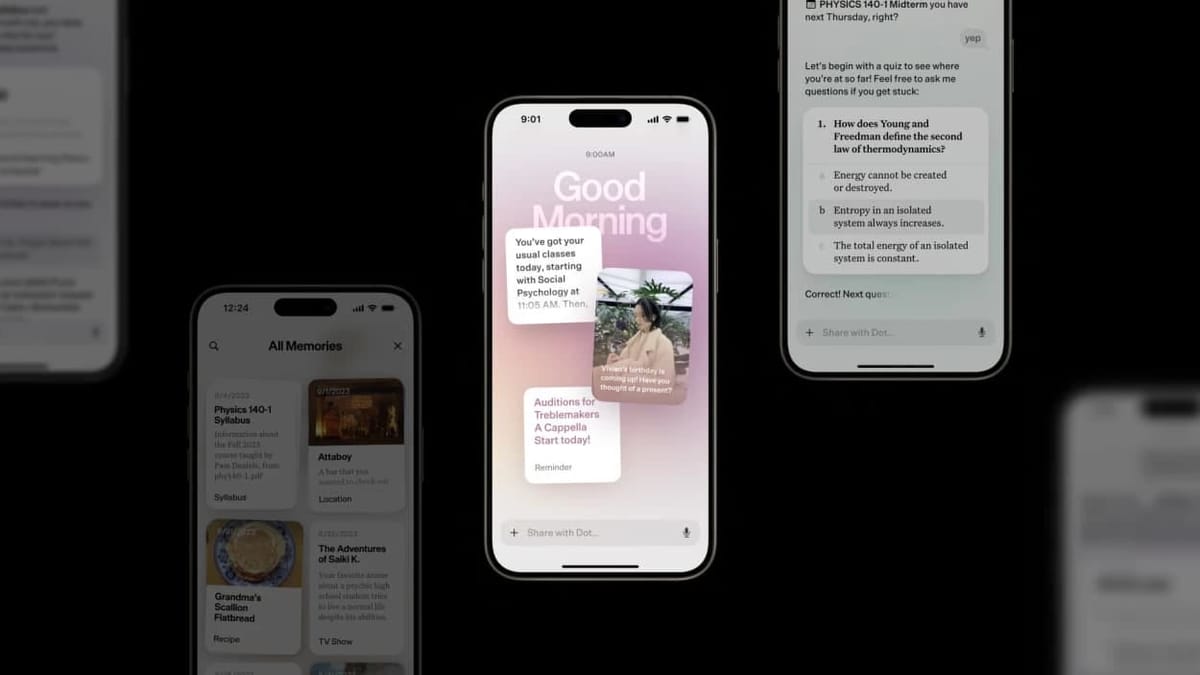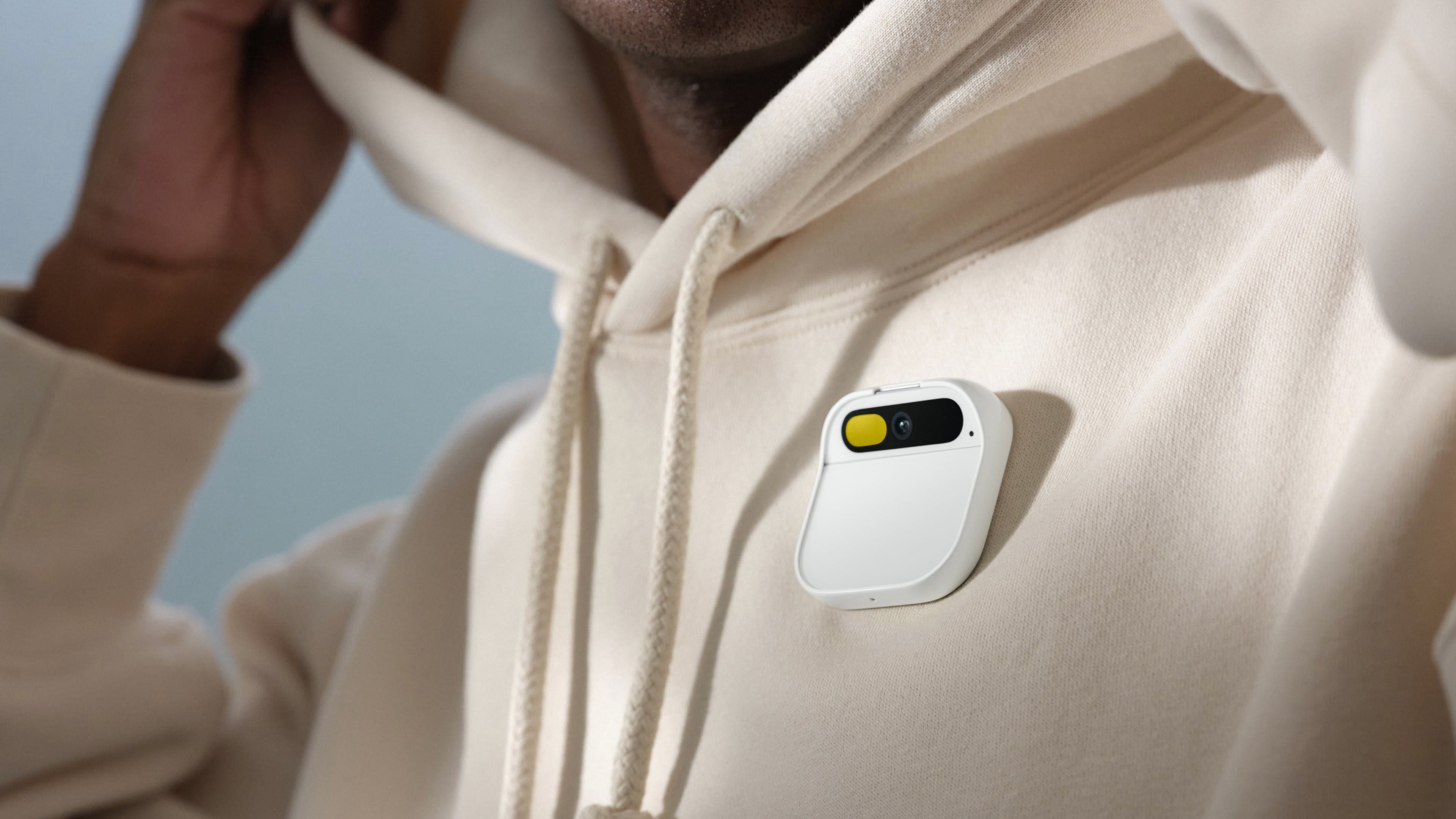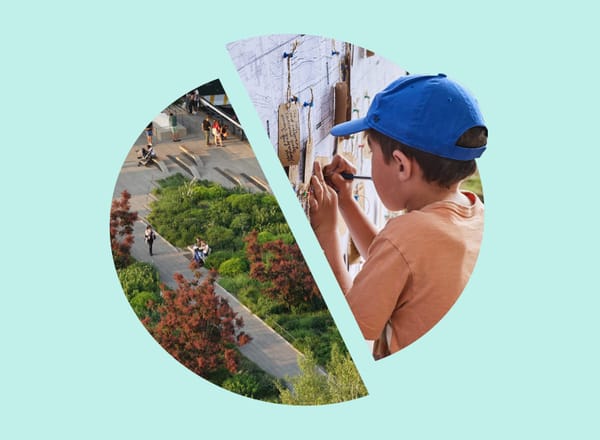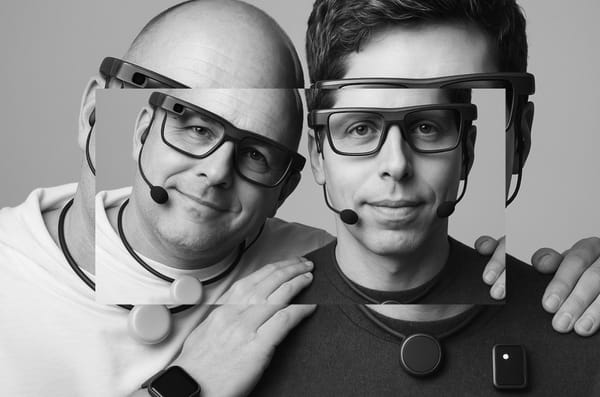Human After All
AI that builds upon what I know, not what the world does

Hi everyone,
We’ve found several limited use cases for generative AI at Frontier, such as quickly spinning up an image of a future we’re outlining or sorting through written input from workshops and experiences we’ve facilitated. At home, I’ve experimented with and read about AI a fair amount, but it has felt more exploratory, more stop-and-start, than propulsive or directional. Nothing I’ve used for myself has gained traction and become routine.
The unveiling of two products earlier this month, one a wearable and the other an app, has helped me recognize more clearly what interaction paradigms I want from intelligent “agents” and assistants. It turns out that I’m seeking something more … well, personal in my personal life. That story is below.
How are you using AI so far? Is it slipping the boundaries of the office and becoming part of your everyday life? As always, reply or comment below to start a conversation.
Love all ways,
Brian
Human After All

Last week, Humane unveiled its AI Pin. In the design and tech communities, it’s likely the most closely watched non-Apple product launch since the Nothing Phone. That’s partly because Humane cofounders Imran Chaudhri and Bethany Bongiorno were longtime Apple leaders and partly because the company has had good positioning and messaging, from its name to its claims of “good intentions” and experiences “built on trust.”
The AI Pin is an amazing achievement but/and I have little interest in owning or interacting with one. Despite the pervasive rhetoric, I, like many people, don’t want to “ditch my phone”—a key proposition of the AI Pin. I also will not swap vision exclusively for voice, not least because I’m often in places where I need to interact with a computing device but not speak out loud. (The AI Pin’s ability to create laser projections on my palm is effectively no substitute for a Retina screen.) Humane’s minute-long commercial ends with the narrator asking, “What if devices weren’t the experience? What if life was?” But pausing a conversation to tap a pin, speak to it, and wait for it to speak a response feels no less disruptive than pulling out one’s phone.
The day the AI Pin launched, New Computer co-founder Jason Yuan tweeted, “moonshots are inspiring. we need more dreamers… dreams who have the courage to Try.” I agree wholeheartedly. Yet my perception of Humane’s limitations is informed by Dot, New Computer’s first product. An “intelligent guide” coming to iOS, Dot—like the AI Pin—abstracts away apps and files. It, too, is ready and waiting to interact with you—on a device you already own—in something resembling a robust, multimedia texting interface.
But unlike Humane’s product-demo video, Yuan and cofounder Sam Whitmore decided to tell a story. This goes back to Yuan’s undergraduate dates in a theater program—quite literally, as the protagonist is Mei, heading off to Northwestern University, Yuan’s alma mater. (New Computer has also tapped a former Northwestern classmate, playwright Clare Glubiak, to help with Dot’s voice and ways of relating.) Mei wants Dot to help her to remember a recipe, buy books for her classes, and study for tests. Dot also proactively suggests some extracurricular activities and ways to celebrate her achievements.
This straightforward tale ends with an emotional twist—exactly the kind of stagecraft that the AI Pin and many other products are missing. It makes the product legible; Dot is about me, not about AI. On the New Computer homepage, the characters ai only show up inside the words “waitlist” and “available.”
As Yuan noted in an interview, “What you’re selling, offering, designing, is a relationship.” Dot is “more introspective, almost melancholy at times, but about self-actualization, your intentions, thoughts, and wisdom versus endless efficiency chasing.” This is the detail that’s important to me: in thinking about these new products, I realize I don’t want a new way to get the weather or see directions to my destination. A portable tool that can effectively search the world’s knowledge has been table stakes for nearly twenty years. I want (and, if you ask people close to me, probably need) something that supplements my faulty memories of my own experiences and encounters. As Yuan and Whitmore note in a letter, “We believe task execution becomes meaningful only when it springs from a deep, contextual understanding of who you are.” Or, as Mark Wilson wrote in Fast Company, “Dot often feels like a life coach that’s pushing me to be my best self.”
Humane’s AI Pin is an opinionated product and a remarkable hardware breakthrough. But as thoughtful designer Édouard Urcades tweeted on the Pin’s launch day, “true technology brothers know these [AI wearable] companies are an easy 4–5 years behind the curve.” What Yuan and Whitmore recognize, and what gets me excited to try Dot, is that there is still plenty of room to grow within current paradigms of human-computer interaction. That runway is in designing conversation—how an AI tool handles memories, how it offers up its own ideas—more than it is in designing hardware.
🔗 Good links
- 📸 Congratulations to the winners of the 2023 Aperture Photobook Awards
- 🤗 Love the landing page for OZIK Soft, a friendly typeface “with rounded edges and welcoming curves”
- 🧠 Artist Refik Anadol, fresh off installations at MoMA and the Las Vegas Sphere, describes “AI as an extension of my mind” in this 20-minute video interview
- 🗽 “For the first time, I do start to see it. Five billion people is almost 600 New Yorks.” Programmer and writer Paul Ford on fathoming climate change’s unfathomable numbers.
- 🗞️ Chris Clarke continues his remarkable run of beautiful editorial design at The Guardian with Long Read magazine
- 📷 “With The last safe abortion, Winant wanted to construct an alternate canon of abortion photography.”





